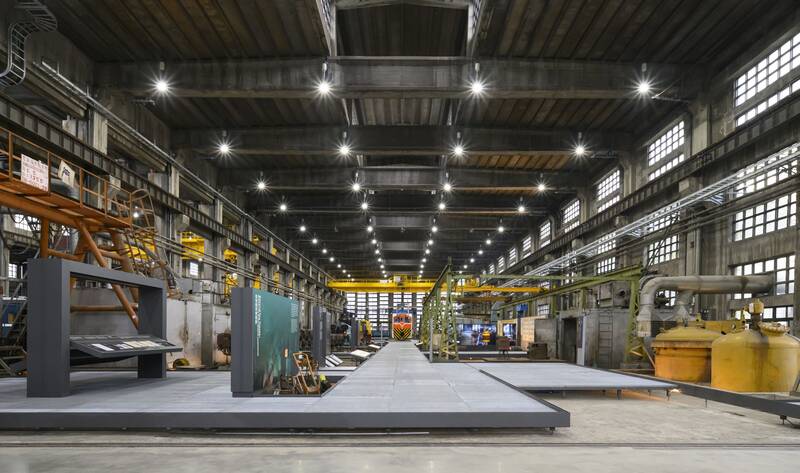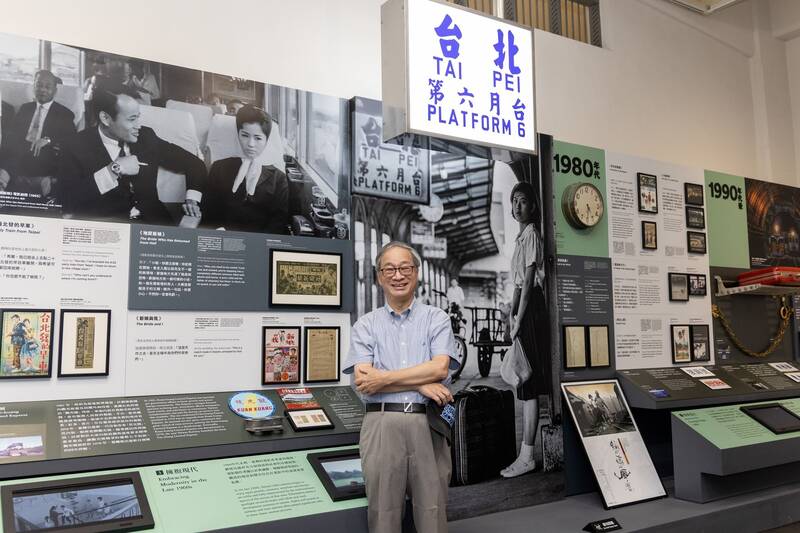Following nearly nine years of restoration work at the former Taipei Railway Workshop, the site is to partially open today as the National Railway Museum (NRM), reviving a historic location where trains still run and memories ride with them.
Built in 1935, the site was once Taiwan's main hub for train maintenance and assembly.
The location was designated a national historic site in 2015, with a project to transform it into a museum through three stages launched the following year.

Photo: Hu Shun-hsian, Taipei Times
The first stage of the preservation and restoration efforts, which covers one-third of the 17-hectare site, is completed and will be open to the public starting today.
A total of five exhibitions are to be held across the Diesel- Electric Locomotive Workshop, which served as the main site for disassembling and reassembling trains and currently stores 24 retired locomotives on display, as well as a bathhouse and the main office building.
According to the Ministry of Culture, a major highlight at the museum is the weekend short ride on a restored blue diesel train, which offers not only a sense of nostalgia, but also a rare opportunity to experience Taiwan’s railway heritage firsthand.

Photo courtesy of the Ministry of Culture
Cheng Ming-chang (鄭銘彰), head of the National Railway Museum preparatory office, said that one of the main challenges behind the nine-year effort was integrating exhibits tailored to different audiences into a protected historic site.
“It was not just restoration,” he said.
“We had to plan exhibits, preserve history and race against time to save old trains,” he said of the retired locomotives and train carriages acquired from Taiwan Railway Corp.

Photo courtesy of the Ministry of Culture
Cheng said that the restoration of the remaining areas is ongoing.
At an opening ceremony at the museum yesterday, Premier Cho Jung-tai (卓榮泰) reflected on his family’s connection to the railways, saying that both his grandfather and father once worked for the railway.
Meanwhile, Minister of Culture Li Yuan (李遠) recalled growing up next to a railway track, calling the smell of engine oil “the scent of memory.”
Lee described railways as a cultural thread that connect generations.

Taipei, New Taipei City, Keelung and Taoyuan would issue a decision at 8pm on whether to cancel work and school tomorrow due to forecasted heavy rain, Keelung Mayor Hsieh Kuo-liang (謝國樑) said today. Hsieh told reporters that absent some pressing reason, the four northern cities would announce the decision jointly at 8pm. Keelung is expected to receive between 300mm and 490mm of rain in the period from 2pm today through 2pm tomorrow, Central Weather Administration data showed. Keelung City Government regulations stipulate that school and work can be canceled if rain totals in mountainous or low-elevation areas are forecast to exceed 350mm in

EVA Airways president Sun Chia-ming (孫嘉明) and other senior executives yesterday bowed in apology over the death of a flight attendant, saying the company has begun improving its health-reporting, review and work coordination mechanisms. “We promise to handle this matter with the utmost responsibility to ensure safer and healthier working conditions for all EVA Air employees,” Sun said. The flight attendant, a woman surnamed Sun (孫), died on Friday last week of undisclosed causes shortly after returning from a work assignment in Milan, Italy, the airline said. Chinese-language media reported that the woman fell ill working on a Taipei-to-Milan flight on Sept. 22

COUNTERMEASURE: Taiwan was to implement controls for 47 tech products bound for South Africa after the latter downgraded and renamed Taipei’s ‘de facto’ offices The Ministry of Foreign Affairs is still reviewing a new agreement proposed by the South African government last month to regulate the status of reciprocal representative offices, Minister of Foreign Affairs Lin Chia-lung (林佳龍) said yesterday. Asked about the latest developments in a year-long controversy over Taiwan’s de facto representative office in South Africa, Lin during a legislative session said that the ministry was consulting with legal experts on the proposed new agreement. While the new proposal offers Taiwan greater flexibility, the ministry does not find it acceptable, Lin said without elaborating. The ministry is still open to resuming retaliatory measures against South

1.4nm WAFERS: While TSMC is gearing up to expand its overseas production, it would also continue to invest in Taiwan, company chairman and CEO C.C. Wei said Taiwan Semiconductor Manufacturing Co (TSMC) has applied for permission to construct a new plant in the Central Taiwan Science Park (中部科學園區), which it would use for the production of new high-speed wafers, the National Science and Technology Council said yesterday. The council, which supervises three major science parks in Taiwan, confirmed that the Central Taiwan Science Park Bureau had received an application on Friday from TSMC, the world’s largest contract chipmaker, to commence work on the new A14 fab. A14 technology, a 1.4 nanometer (nm) process, is designed to drive artificial intelligence transformation by enabling faster computing and greater power